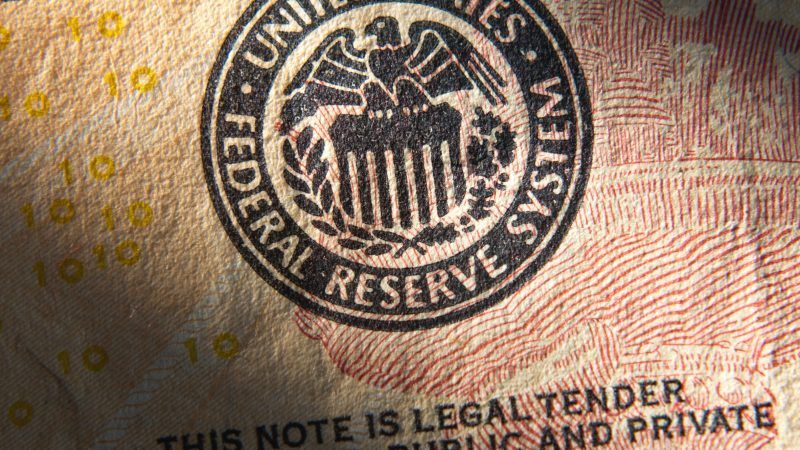Trump Demands Zero Interest Rates From "Boneheads" at the Federal Reserve
Such a move would emulate other economies, risk inflationary bubbles, and benefit his businesses.

President Donald Trump tweeted this morning that "The Federal Reserve should get our interest rates down to ZERO, or less, and we should then start to refinance our debt. INTEREST COST COULD BE BROUGHT WAY DOWN, while at the same time substantially lengthening the term. We have the great currency, power, and balance sheet………The USA should always be paying the lowest rate. No Inflation! It is only the naïveté of Jay Powell and the Federal Reserve that doesn't allow us to do what other countries are already doing. A once in a lifetime opportunity that we are missing because of 'Boneheads.'" (The president has long made it clear that obedience to his whims is the most important quality he seeks in members of the Federal Reserve Board.)
Those who approach monetary policy from a free market perspective mistrust—and see as inherently artificial and manipulative—using Federal Reserve interest rate policy to satisfy short-term political goals.
George Selgin, director of the Center for Monetary and Financial Alternatives at the Cato Institute, said in an email this morning that Trump's "repeated badgering of Fed officials, calling for them to ease monetary policy despite near-target inflation, robust spending growth, and low unemployment, has one thing to be said in its favor: assuming that these statistics don't change dramatically, it offers the Fed a unique opportunity to prove that its much-ballyhooed independence is, after all, not just a fairy tale."
Selgin further writes that, contra Trump's implication, "it simply isn't true that there is no risk of inflation, or that the Fed isn't capable of generating it. It's true that rate settings consistent with the Fed's 2 percent inflation target are much lower than they would have been some time ago. But the Fed can still go too low; and every usual indicator suggests that setting rates at zero, let alone below, would be setting them way too low."
"Although U.S. inflation numbers have tended to be slightly below 2 percent," Selgin adds, "'slightly' is the operative word. A difference of a few tenths of a percentage point from target is hardly enough to call statistically significant, let alone enough to justify a policy rate setting change of two or more percentage points!"
Robert Murphy, a senior fellow with the Mises Institute, says in an email this morning that, from his Austrian perspective, in which "interest rates are market prices with an important job to do," Trump is playing with fire: "It was artificially low interest rates that helped blow up the housing bubble and led to the financial crisis in 2008. President Trump's call for zero or even negative (!) interest rates would not be medicine, but in fact poison, for the long-term health of the economy."
Murphy is not persuaded by folks who point to other countries that have tried or are trying what Trump proposes. "Some are pointing to Japan as a country that's had large deficit spending and aggressive monetary stimulus for decades without a breakout of price inflation," Murphy says. "Even on its own terms, at best this is saying, 'We too could have a stalled economy for 30 years here in the U.S., let's follow their model.'"
(For some insights from a market-oriented economist on how policies such as the one Trump is advocating played out in Japan in past decades, see Benjamin Powell's "Explaining Japan's Recession.")
From the more mainstream press, USA Today observes that:
If the Fed cuts rates dramatically when the economy is still sturdy, consumers and businesses likely would view the move as a sign of trouble, prompting many to pull back spending and possibly leading to the growth slowdown they fear.
"I think that's a panic move to (lower rates) that severely," says Jacob Oubina, senior economist at RBC Capital Markets, who thinks the Fed should continue to cut at a moderate pace to shift the yield curve to a traditional status with short-term rates below long-term ones. Investors "will think the Fed knows something the market doesn't know."
CNBC reminds us that such a move would throw under the bus those who dare to merely save and not speculate. The Washington Post, meanwhile, wonders how much debt-riddled businessman Trump could save if he pressures the "boneheads" at the Fed into doing his whim.
The New York Times gives the larger global economic context: "The European Central Bank is expected to cut a key interest rate to a record-low negative 0.5 percent and roll out additional stimulus measures at its meeting on Thursday, in a bid to shore up very-low inflation and waning growth in important economies like Germany. Central banks around the world have been lowering their policy rates, partly because Mr. Trump's trade war is combining with Brexit jitters and a global manufacturing slowdown to threaten growth in many nations."


Show Comments (59)